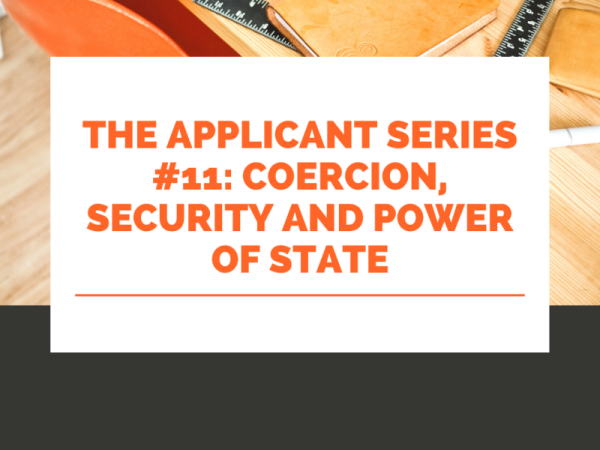The Applicant Series showcases works done by hopeful writers who have applied with inkmypapers over the years. The results and comments will be provided first, followed by the actual essay/report written by the applicant
Applicant’s Results: Failed
Title: The State has a monopoly over the use of coercion.
Comments: This applicant made two critical mistakes. Firstly, she did not sufficiently understand the question before jumping straight in. This is what we see from most applicants. They look at the question, think that they got it, and start writing. In this case, you can see that the failure to state the statement “The State has a monopoly over the use of coercion” in the essay makes the piece a confusing read, where you do not actually know what the goal of the essay is if you do not know the question.
Secondly, perhaps linked to the first point as well, she did not plan the essay properly. As the question has two parts to it, the applicant did not decide how many words to allocate for each part. As a result, she did not sufficiently do a compare and contrast between the concepts of ‘power’ and ‘security’ of a state.
Although not seen from the piece as we have removed the references section, the applicant has very messy references list; a sign that the applicant does not have the right attitude to be part of our team.
In the contemporary political thought, it has been a widespread view that the power of the state is coercive or that governments must resort to the use of force in maintaining the laws. It is widely thought that the state, as part of its power, can force people to do certain things they will not do if punishments are not available.
This political thinking is formalized by sociologist Max Weber and supported by various contemporary political theorists. Weber (cited in Morris, 2001) reasons that the state should be defined by its means, not by its ends since there are numerous goals and tasks every state would have. He thus, defines the modern state as a body or human community that can claim monopoly over the legitimate use of physical force within its territory. This negates the position of Thomas Nagel (2005), an American philosopher, that humanity should be recognized as an end rather than a means.
Although force is regarded as a critical component of a modern state and an essential feature of a state power, Weber (cited in Morris, 2001) points out that in the efforts to regulate society, the customs and laws should remain as the primary means. Physical force should only be implemented with legality to provide sanctions to those who violate the rules accepted by the society. The state is thus, presented as the only legitimate entity that has the policing, coercive powers to maintain law and order, and the legitimacy of the use of force is only valid when permitted by the state. Should the state delegate the use of this coercive power, the ownership and the legitimacy remain with the state or the government. The ideology has even fueled the creation of states in Europe, as argued by Charles Tilly (cited in Morris, 2001). As well in Asian countries, state coercion plays a crucial role in nation building, political domination, and maintenance of internal order and international security (Alagappa, 2001).
This control over physical force or violence and territoriality to sustain the rule of the state has also been supported by Anthony Giddens, as cited by Alagappa (2001), in his definition of a modern state. John Rawls (cited in Morris, 2001), as well, provided his claim that the political power is a coercive one supported by sanctions implemented by the government, which has the only authority to use force to protect the law.
In terms of the power of the state and its relation to its monopoly on coercion, Locke (cited in Zalta, 2015) equates political power to the right to constitute laws, thus, authority is given to the state to make laws that will coerce its constituents. But if this is the case, where is the line drawn? This is also the classical concern of many political thinkers that object to this practice. Over time, especially with the shifts in the practices of the state brought about by globalization, the question of whether an absence of coercion is feasible, of whether a state that does not need to threaten harm for people to act is conceivable. Robert Nozick, for one, who supports anarchism, objects state coercion and argues that it is immoral due to the violations of human rights done in the course of monopolizing the use of violence (cited in Zalta, 2015). Also supportive of anarchism, Michael Taylor emphasizes the dispersal of force rather than the concentration to the state on the use of force (cited in Morris, 2001).
Meanwhile, under the utopian thinking, it is believed that it is coherent to think of a state that does not employ force to secure obedience and compliance. In this, there is a possibility of a legitimate state where the laws are just and obeyed by those subjected to the laws. But even with existence of laws, cases of disobedience and violations to the laws that may result from ignorance, irrationality, or choice of defiance are still prevalent (Morris, 2001). But Hart insists that it cannot be assumed that hostile activities or threats to security will follow these cases of deviations from the laws. His arguments suggest that the use of physical force may not always be necessary.
French postmodernist Michel Foucult has a different influence in the appreciation of power. His explanations departs from the idea of power as a driving force or instrument for coercion. It is evident in his writings that power is everywhere and not solely with the state. He highlights that power can be applied to daily life, and provides individuality and identity (Faubion, 2001). Foucault explains that the purpose of the government is to govern and structure the many possibility of actions of the people to maintain some kind of order. He qualifies that power of the government is exercised only over free subjects or people who have the capability or capacity to conduct in many ways, thus, there is no relationship of power at all if people are oppressed. Based on Foucult’s theories, the more the subjects are coerced and perceived as secure, the less opportunities they have, the less powered both the state and the people, and the slower the growth of society is; but with freedom, people having the potential for growth, the more powerful both the state and the people become. This can easily be related to the case of North Korea, where coercive power is exercised and the economy, as a consequence, is oppressed; and in the Europe, where democracy is implemented and economy is strong and highly diversified.
The above philosophers and theorists hope to point out that there may be other, more important, ways to influence behaviors other than coercion, although some agree that the idea and practice of coercion may not be eroded completely. They argue that political power may indeed be coercive, but it may not always be the case. Success in changing behavior could also be done by the government through initiatives like information campaigns, and establishments of action standards (cited in Morris, 2001). Objections to the coercive characteristics of the state claim that there are other means to address faults in society, that one way may be a shift towards people empowerment and increase in access to opportunities may erase possible disruptions to peace and order, and security.
With the varying effects of coercion to different societies, as well the varying effects of certain degrees of freedom, what seems to be clear is there is no general strategy on security and exercise of power that can be applied to all states. The legitimate use of physical force and power, exercised under the limits of the law if truly needed on specific conditions, may be effective for one state but not for the others. The key, in this time and age, with the potential of humanity explored, is to view the common good and empowerment of humanity as the end goals.
0 Comments
Leave a reply
You must be logged in to post a comment.



